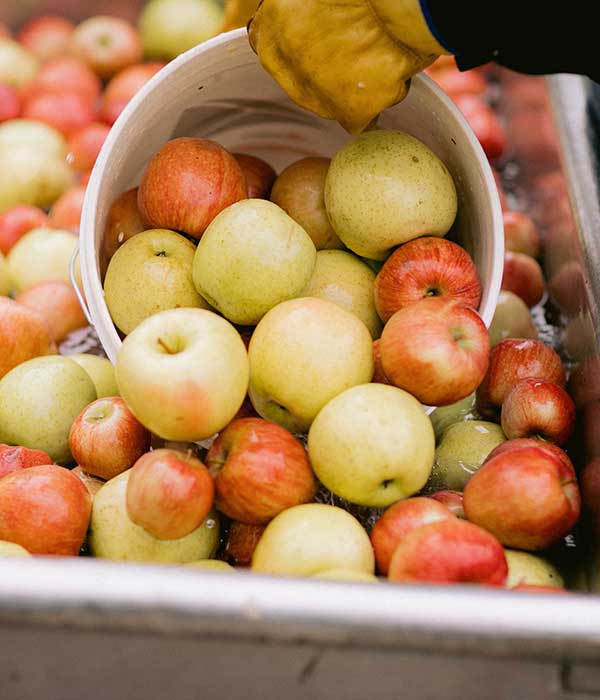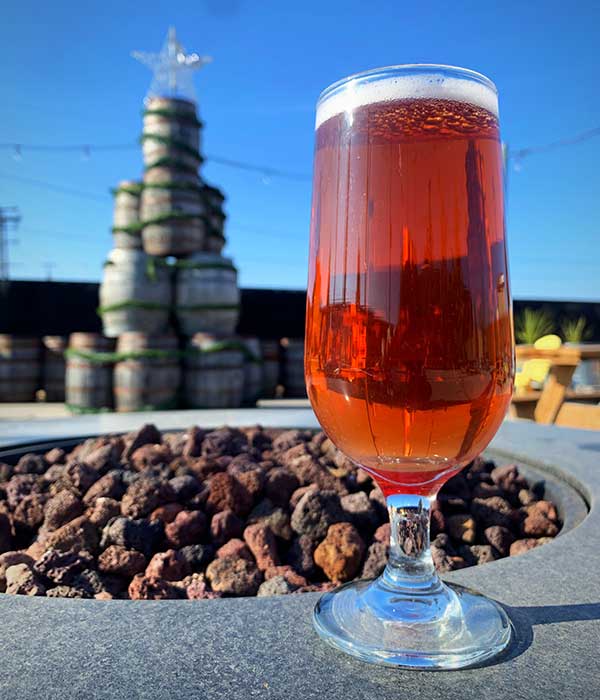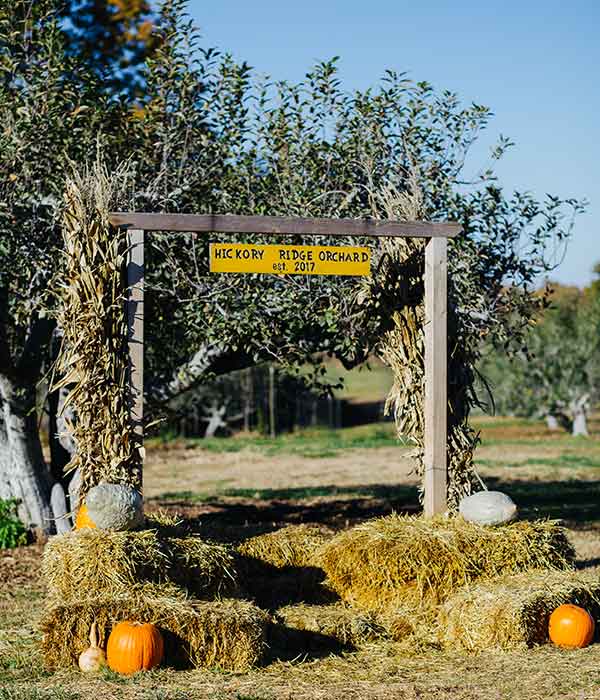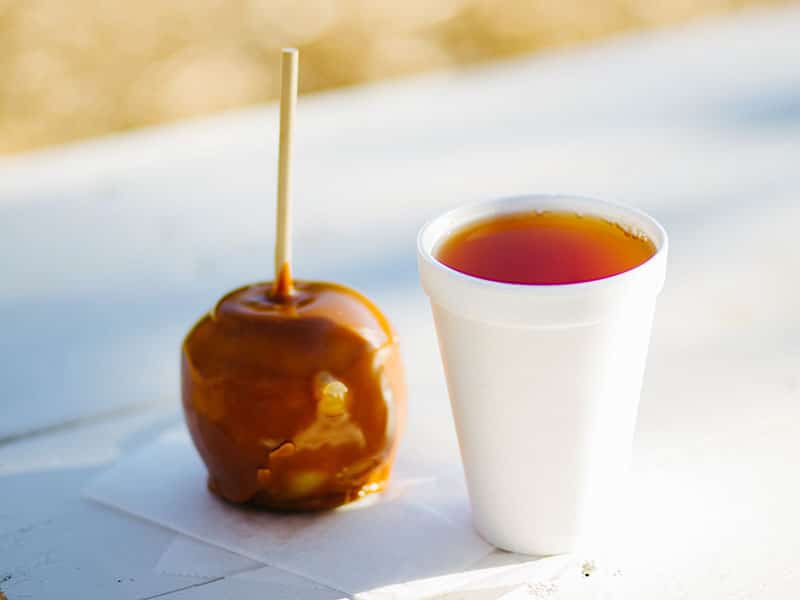This article was originally published in our September 2021 Issue | Story by Corin Cesaric & Evan Wood
Of all the fruits that grow on earth, the apple is perhaps the most beloved. Apple trees have been domesticated, selected, and grown by humans for as long as we’ve been cultivating our own food, and they have been providing food, shelter, and nectar to countless species of birds, mammals, and insects for at least as long.
It’s as much prized by fauna for its bark, leaves, and blossoms, which provide nourishment to them year-round, as it is for its comparatively fluctuant fruit, which only avails itself in late summer and early fall, and in the natural world can vary drastically in terms of abundance. The fruit of one wild apple tree may be only as large as a blueberry, and a wild tree that has borne a substantial crop of apples one year tends to give itself a break the next, producing in only middling quantities. Animals, of course, enjoy the fruit too.
For discerning, fussy Homo sapiens, the fruit is the main attraction. It’s not difficult to discover why: apple trees are hardy, resilient organisms that can compete with prolific weeds, survive near-constant animal browse, and recover from wounds and infections with uncommon aplomb. If you’re a species looking for a reliable staple crop, you could certainly do worse than apples. That’s probably why references to apples can be found in foundational texts ranging from Homer’s works to the Icelandic Prose Edda, the Old Testament, and beyond. The earliest apples growing in the state would most likely have been Malus ioensis, the prairie crabapple, which is native to the Show-Me State as well as Iowa, Wisconsin, Illinois, and a few other states in small pockets. European settlers brought over the orchard apple species we know today. The Stark Bro’s Nursery and
Orchard Company, or Stark Bro’s, founded in Louisiana, Missouri, in 1816, helped popularize the red and golden delicious apples from which an estimated 60 percent of other cultivars descend today.
Whether found in a pie filling, hard cider, or consumed on its own, an apple is indeed something to celebrate. With that in mind, Missouri Life proudly presents the following Apple Almanac, replete with information on hard local apple cideries, apple festivals, and Show-Me State apple orchards. You can also find classic apple recipes available online at MissouriLife.com.
Fine Apple Festivals
Celebrate apples across the state at these events.
Seymour Apple Festival • September 9–11
The Seymour Apple Festival has been going strong for nearly fifty years in the small town of Seymour, about thirty miles east of Springfield. The event draws over ten thousand visitors annually, and features live entertainment, a parade, and a 5K run. The apple fest will have food and craft vendors selling handmade goods and caramel apples among other fare. The festival has no shortage of entertainment for children, including a one-mile run, a Johnny Appleseed costume contest, a pet show, a decorated bicycle contest, and turtle races. There is also an Apple Princess contest for local youth. Adults and children alike can compete in apple peeling contests where the object is to peel an apple and at the end have the longest unbroken peel. The current record is a 130-inch peel.
Learn more at SeymourAppleFestival.com.

Mt. Vernon Apple Butter Makin’ Days • October 8–10
There’s something about southwestern Missouri and apple festivals. Of the state’s most conspicuous fests, four of them take place within a forty mile radius of Springfield, including the Seymour Apple Festival, Marionville Applefest, Springfield Cider Days, and Mt. Vernon’s festival, which has been held on the Lawrence County Courthouse lawn each year since 1967. Apple butter and the making of it is the main attraction at Mt. Vernon’s festival. The butter is made using traditional practices in copper kettles over open fires. The proceeds from the sale of the butter help fund charitable causes. The festival has traditional contests like apple pie eating and an apple queen pageant, as well as quirkier events like beard and mustache growing, bubble gum blowing, wiener dog races, and husband calling. There will also be a parade, lots of food and drink vendors, a kids area with pony and camel rides, and live music.
Learn more at MtVChamber.com/apple-butter-makin-days.
Clarksville Apple Fest • October 9–10
If you’re looking for small town fun, the Apple Fest in Clarksville, population 442, is a great place to experience a sense of living history. The town is home to the Clarksville National Register Historic District, which features sixy-six historic buildings including the Clifford-Wyrick House. Situated on the Mississippi River north of St. Louis, Clarksville has been holding its annual festival for more than forty years. The festival features a queen contest, a baby contest, a parade, food and craft vendors, and plenty of small-town charm. Past years have also featured apple bake-offs and fiddler contests, among other live entertainment options.
Learn more at Facebook.com/clarksville-apple-fest.

Kimmswick Apple Butter Festival • October 30–31
When you imagine apple festivals in Missouri, Kimmswick’s annual Apple Butter Festival may be the image that comes to mind. The festival has been going on for almost four decades and draws an estimated one hundred thousand visitors annually. With hundreds of vendors and the whole city’s streets closed to traffic for the event, it’s not hard to understand why so many people flock to this town on the banks of the Mississippi just over twenty miles south of St. Louis each year. The Kimmswick Historical Society gathers and peels apples the day before the festival begins, and each day during the festival a fire is lit before dawn, a kettle is filled with apples, and the butter making begins. The apples must cook in the kettle for up to eight hours before they turn to butter ready to be jarred. In the meantime, visitors can enjoy live music, food, drink, and craft vendors, as well as attractions for children such as a miniature train and petting zoo.
Learn more at GoKimmswick.com/apple-butter-festival-kimmswick.
Serving Cider
Hard cider has made a name for itself in Missouri in a big way.
Craft breweries have been on the upswing for decades, but now it’s time for hard cider to shine. When people think of hard cider, they typically think of a sweet drink, but that’s not always the case. Missouri companies have been experimenting with classic cider and creating new tastes that satisfy every palate. Here are four places you can visit in Missouri’s four largest metros.
Columbia
Judson Ball, Andrew Sharp, and Tyson Hunt are best known for their tasty craft beer creations at Logboat Brewing Co. in Columbia, but now they have another skill to add to their repertoire—cider making.
Waves Cider Co. opened in the summer of 2020 and offers a variety of ciders in cans and on tap. Initially, they created a semi-dry cider and dry cider but have since expanded their menu to include Hibiscus Cider and Cider-Mosa along with cider cocktails.
The Logboat founders have mastered the beer scene in Columbia, but wanted to create a gluten-free alternative to beer. In addition to purchasing the cider at Waves and Logboat, you can find their colorful cans in local grocery stores in mid-Missouri.
In the taproom, you’ll also find cans and bottles of other ciders from around the country, such as Ace Pineapple Cider from Sonoma County, California, and a few from other places in Missouri, such as Brick River Homestead Cider (see St. Louis at right).
Kansas City
Bryce Shaffter first got his start home brewing more than a decade ago, but he wasn’t just experimenting with craft beer. His wife loves hard cider, so he set out to learn how to make that drink, too. Although most breweries don’t create cider and beer in the same space, in 2013, Cinder Block Brewery opened its doors in Kansas City with both beverages available on tap.
“When I decided to open up a brewery, one of the promises I made was that I would continue to make hard cider,” Bryce says.

Cinder Block Brewery has two ciders on tap year-round, the English Cherry Cider and French Cider, plus seasonal releases, such as the Cherry Limeade Cider made with cherry juice and lime.
“There are a lot of people who come to a craft brewery to get beer, but we have so many people that leave drinking cider,” he says.
Springfield
Saint Fox Cider has been distributing its cider to local businesses in the Springfield area—such as 4 By 4 Brewing Company and Best of Luck Beer Hall—since 2018, but there are plans to open a brick-and-mortar in the works. Owners Ian Carleton and Tim Robson began making cider because they knew they could source their apples entirely from Missouri.
“We really wanted to carry that local ethos that for better or for worse it’s the job of cider makers, wine makers, brewers, and whomever is involved in beverage making to kind of look at the land around them and figure out really delicious ways to use what’s available,” Ian says. “And for us, cider was a natural fit that we didn’t feel like anybody was paying enough attention to.”
Their Saint Fox Rose Cider uses Missouri chambourcin wine grapes, and the Fox Light cider is accented with orange and juniper. Ian and Tim allow themselves to experiment with that recipe to create new flavor profiles, and now they are planning to bring new ones to the scene.
At the end of 2020 they released StrongField Cider, a tart peach cider that uses peaches from Gardner’s Orchard & Bakery in Brighton. Not only are Ian and Tim passionate about using local Missouri produce, but they also dedicate themselves to doing all of the work associated with cider production.
“When you get a twelve-ounce bottle of Saint Fox Cider, that’s about two and a half pounds of apples that Tim and I hand-hauled and hand-crushed and -pressed, just the two of us,” Ian says.
St. Louis
Brick River Cider founder Russ John moved to St. Louis from Boston and quickly saw an opportunity in the Show-Me State.
“The cider business had been raging pretty hard on both the east and west coasts for five plus years already, but it had not really caught on in the Midwest,” he says.
He opened Brick River Cider in 2018. Instead of buying apples, then pressing them in St. Louis, Russ has found it more efficient to purchase the apple juice instead from orchards. The apple juice used in the cider comes from a handful of midwestern states, including Missouri, Illinois, Michigan, and Nebraska. Happy Apples in Washington, Missouri, is his main source of apple juice in Missouri.
“We thought we would pitch in to sustain fruit growing in the Midwest,” Russ says.
Brick River Cider has six year-round ciders, three seasonal ciders, and three special occasion ciders. “Everyone knows beer brewing has been the dominant thing, and everyone knows there are like twenty to thirty different beer styles—and that same thing applies to ciders,” Russ says.
Read our 2018 story about Brick River Cider’s opening in St. Louis at MissouriLife.com/brick-river-cider
The Apple Doesn’t Fall Far From the Tree
Learn how this popular farm and apple orchard in Mexico, Missouri, came to fruition.
Brandt and Kelsey Schisler loved living in Fort Collins, Colorado, but Brandt wanted something more. He soon realized what he was longing for was living on a farm.
“I felt like I was missing something—a void,” Brandt says. “And so what kept coming back to me was the wide open spaces of the farm that I grew up on back home. There’s a nostalgia there where you kind of get this feeling of simplicity, but it’s the farthest thing from simple when it comes to the actual work.” Brandt and Kelsey are originally from Illinois.

The husband-and-wife team now own Hickory Ridge Orchard in Mexico, Missouri, where there is a three-acre apple orchard with more than twenty varieties from which to choose, a corn maze, pick-your-own sunflowers, hay-rack rides, pumpkins, gourds, and mums, a petting zoo, and more throughout the year. Since opening in the fall of 2018, they’ve added two more members to the team, Tommy and Kaitlyn Swon, who live next door to the farm.
While Brandt and Kelsey were searching for land to start an orchard on, Sandy Binder reached out to them and asked if they were interested in buying her farm, Binder’s Hilltop Apple & Berry Farm, which she started in 1986 with 1,100 apple trees. When Brandt and Kelsey took over the farm, there were about 450 apple trees left.
“She was almost eighty when we took over the farm, so it needed a lot of work,” Brandt says. “We saved what we could, but now the orchard is up to almost 2,000 apple trees. We have a five-year plan, so by 2025, we’ll have about 4,500 apple trees.”

Apples are available to the public from late July until early November. The U-pick apple orchard is available for groups that are interested in booking a farm tour this fall and will be open to the public when the new trees begin to bloom in the spring. With the apples they grow, they also press all of their own fresh cider and sell it along with apple cider donuts, caramel apples, and mini apple pies.
“We are one of the last farms that does raw, unpasteurized cider, and people come here just for that because when you pasteurize cider it just doesn’t taste the same. So a lot of the people that are coming here and getting it are saying, ‘Oh, I haven’t had this since I was a kid.’ ”
Brandt and Kelsey decided to settle in Missouri despite the difficulty of maintaining fruit trees here. “It’s extremely hard to grow apples here in Missouri because of our subtropical climate with the high humidity,” Brandt says. “With larger amounts of rain like we get, we get more fungal and bacterial issues on apple trees, and it’s a lot harder than if I was growing apple trees in Iowa, Minnesota, or Michigan.”
The couple’s two children, Theodore, two, and Olivia, six months, also enjoy growing up on the farm. Brandt and Kelsey have also worked hard to turn their apple orchard entirely organic. Brandt has spent hours researching how to do so in Missouri and found the best way is to create beneficial microbes that will ward off parasitic fungus and spray that on to the leaves of each tree.
“We’re literally just trying to create an army of beneficial bacteria and fungi, to fight off the pathogen bacteria and fungi—and that’s how we’re able to do organics here in Missouri.”
Now more than two years in, they have been successful in the endeavor.

“That first year was really hard but we learned from that,” Brandt says. “This year, knock on wood, the trees are really starting to come. It’s nice to come out to the orchard and see the hard work you put in is starting to work. Our orchard is full of ladybugs helping us fight the good fight and there are just a lot of beneficial bugs and birds out there that wouldn’t previously be out there in a non-organic setting.”
At thirty-six months, Hickory Ridge Orchard will be eligible to become a certified organic orchard. “After a long day of working on the farm, it’s a huge sense of accomplishment,” Brandt says. “Then you get to see your kids getting eggs or feeding the pig and they’re just lighting up so much because they’re just so happy to be outside and doing those things. So that really was the pursuit.”

Apple Orchards Around the State
Centennial Farms
199 Jackson St., Augusta
John & Linda’s
Fruit and Berry Farm
2428 Texas Prairie Rd., Bates City
Murphy Orchard
255 US-60, Marionville
Peters Orchards and Market
32651 US-65, Waverly
Thierbach Orchards and Berry Farm
85 Town Branch Rd., Marthasville
West Orchards
25875 Jewell Ave., Macon
Someones in the Kitchen With Apples
Apples take center stage in these recipes collected by Lee Jackson of Maryville, who has authored cookbooks including Apples Apples Everywhere and From the Orchard.
Apple Pandowdy
Serves 9
Ingredients:
• 4 cups apples, peeled and sliced
• ¼ cup sugar
• ½ teaspoon cinnamon
• 2 tablespoons butter
• ½ cup sugar
• ½ cup butter
• 1 egg, beaten
• ½ cup flower
• ½ teaspoon baking powder
• ¼ teaspoon salt
• 1 teaspoon vanilla
Directions:
1. Place sliced apples in a buttered 9×9 inch baking pan or 2 qt. Casserole. Sprinkle with cinnamon-sugar mixture. Dot with butter.
2. Cream sugar and butter. Add egg and beat well. Sift together flour, baking powder, and salt. Mix until mixture is well combined. Add vanilla and stir in.
3. Drop by spoonfuls over apples and bake in 350 degree oven for 30-35 minutes, or until lightly browned. Serve warm or cold with ice cream, if desired.
Apple Cheese Casserole
Serves 4
Ingredients:
• ½ cup flour
• ½ cup sugar
• ¼ teaspoon salt
• ¼ cup butter
• 7 apples, peeled, cored, and sliced
• ⅓ cup water
1 tablespoon lemon juice
1 cup cheddar cheese, freshly grated
Directions:
1. Combine flour, sugar, and salt. Mix well. Cut in butter until mixture resembles coarse meal.
2. Toss apples with water and lemon juice. Spoon into greased 8-inch casserole dish and sprinkle with flour mixture.
3. Bake uncovered at 350 degrees for 30 minutes. Pull out and top with cheese, then bake again for five minutes or until cheese is melted.
Apple Cider Pie
Makes one pie
Ingredients:
• Pastry for a one-crust 9-inch pie
• 2 cupes sliced Jonathan apples
• 1 tablespoon lemon juice
• ½ cup sugar
• 3 eggs
• 1 cup heavy cream
• ¼ cup Louisburg Apple Cider
• ¼ teaspoon cinnamon
• ¼ teaspoon nutmeg
• 2 tablespoons sugar
Directions:
1. Preheat oven to 400 degrees.
2. Fit pastry into a 9-inch pie pan.
2. Toss apple slices with lemon juice and ½ cup sugar. Arrange apples in pie crust, then bake for 10 minutes.
3. Reduce oven temperature to 350 degrees, bake 20 minutes more.
4. Beat eggs slightly in a bowl. Stir in cream, apple cider, and spices.
5. Pour over apples and bake 15 minutes more.
6. Sprinkle with remaining 2 tablespoons of sugar and bake 15 minutes more or until top is golden brown. Cool for two hours, then serve.
Find a seared pork chops with apples recipe here and an apple bavarian torte recipe here.
Photos // Holly Kite, Saint Fox Cider, Cinder Block Brewery, Brandt Schisler
Related Posts
Revitalizing Missouri Downtowns
Here’s how Missourians are working together to revitalize downtowns across the state.
Pies, Cider, and Woodworking
Here’s what is happening in Columbia this month
Yeasted Waffles With Cider Syrup
These waffles are the perfect treat for a brisk winter morning. The cider adds a hint of tartness to the flavor of the batter, and the cider syrup takes this dish a few notches above your average waffles!



